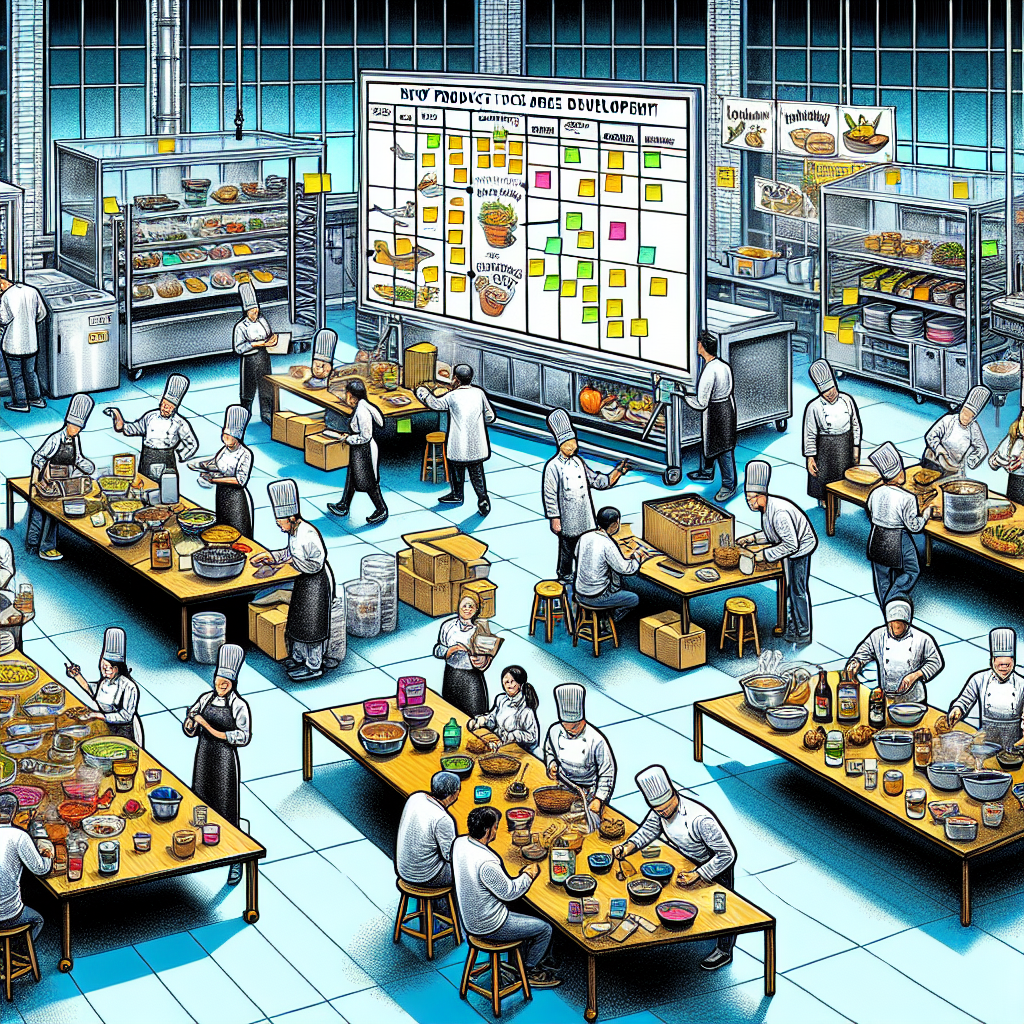Development of New Products in the Food Industry with the Incorporation of Agile Techniques
-
Table of Contents
- Agile Techniques Revolutionizing New Product Development in the Food Industry
- The Agile Approach in Food Product Development
- Statistics Supporting Agile Adoption in the Food Industry
- Case Studies of Agile Success in Food Product Development
- Implementing Agile Techniques in the Food Industry
- Challenges and Considerations
- Conclusion: Agile’s Impact on the Future of Food Product Development
- ETprotein: Innovating with High-Quality Protein Products
Agile Techniques Revolutionizing New Product Development in the Food Industry

The food industry is a dynamic and ever-evolving sector, with consumer preferences and technological advancements driving continuous innovation. In recent years, the incorporation of agile techniques has been a game-changer in the development of new products. Agile methodologies, which originated in the software development industry, have been adapted to fit the unique needs of food product development, offering a flexible, iterative approach that emphasizes customer feedback and rapid prototyping.
The Agile Approach in Food Product Development
Agile product development in the food industry is characterized by cross-functional teams, iterative cycles, and a focus on delivering value to the customer. This approach contrasts with traditional waterfall methods, which often involve linear, sequential stages that can be slow to adapt to changes in market demands or consumer tastes.
- Customer-Centric Focus: Agile development prioritizes customer needs and preferences, using feedback to shape the product from the early stages of development.
- Iterative Development: Products are developed in short cycles, allowing for frequent reassessment and adjustments based on real-world testing and feedback.
- Cross-Functional Collaboration: Teams composed of members from various departments, such as R&D, marketing, and production, work together to ensure a holistic approach to product development.
Statistics Supporting Agile Adoption in the Food Industry
Recent studies have shown that companies adopting agile practices can experience significant benefits. For instance, the 14th Annual State of Agile Report indicates that 95% of respondents report their organizations practice agile development methods. While this report is not specific to the food industry, it reflects a broader trend towards agile adoption across sectors.
In the food industry, agile techniques have led to a reduction in time-to-market for new products. According to a report by McKinsey & Company, companies that have successfully implemented agile practices have seen up to a 40% reduction in time-to-market and a 25% increase in productivity.
Case Studies of Agile Success in Food Product Development
Several leading food companies have embraced agile methodologies with impressive results. For example:
- A multinational beverage company used agile practices to reduce its product development cycle by over 50%, allowing it to respond more quickly to emerging trends.
- A global snack food brand implemented agile sprints to develop new flavors, resulting in a 30% increase in successful product launches.
Implementing Agile Techniques in the Food Industry
Adopting agile methodologies in the food industry requires careful planning and a willingness to embrace change. Here are some key steps for successful implementation:
- Training and Education: Teams need to be trained in agile principles and practices to ensure a common understanding and approach.
- Adapting Agile to Fit the Industry: While agile techniques can be highly effective, they must be tailored to address the specific challenges and regulatory requirements of the food industry.
- Embracing a Culture of Innovation: An agile mindset encourages experimentation and learning from failure, which can be a cultural shift for many organizations.
Challenges and Considerations
While the benefits of agile are clear, there are challenges to its implementation in the food industry:
- Regulatory Compliance: Food products are subject to strict safety and quality regulations, which can complicate the rapid iteration typical of agile methods.
- Supply Chain Complexity: The food industry’s complex supply chains can make quick pivots and changes more difficult to execute.
- Consumer Safety: Ensuring consumer safety is paramount, and any agile process must maintain rigorous testing and quality assurance standards.
Conclusion: Agile’s Impact on the Future of Food Product Development
The incorporation of agile techniques in the food industry has the potential to significantly enhance the development of new products. By fostering a culture of innovation, emphasizing customer feedback, and enabling rapid iteration, agile methodologies can help companies stay competitive in a fast-paced market. As the industry continues to evolve, agile practices are likely to become an integral part of the product development process, leading to more diverse and responsive product offerings.
ETprotein: Innovating with High-Quality Protein Products
In line with the agile approach to product development, ETprotein is at the forefront of providing high-quality protein products that cater to the evolving needs of the food industry. Their extensive range of organic bulk vegan proteins and L-(+)-Ergothioneine (EGT) products are designed to meet the demands of consumers seeking non-GMO, allergen-free, and pure protein sources.
ETprotein’s commitment to innovation and quality makes them an ideal partner for food industry players looking to develop new products using agile techniques. Their expertise in tailoring protein solutions ensures that companies can quickly adapt to market trends and consumer preferences, reducing time-to-market and enhancing product success.
About ETprotein:
ETprotein, a reputable protein and L-(+)-Ergothioneine (EGT) Chinese factory manufacturer and supplier, is renowned for producing, stocking, exporting, and delivering the highest quality organic bulk vegan proteins and L-(+)-Ergothioneine. They include Organic rice protein, clear rice protein, pea protein, clear pea protein, watermelon seed protein, pumpkin seed protein, sunflower seed protein, mung bean protein, peanut protein, and L-(+)-Ergothioneine EGT Pharmaceutical grade, L-(+)-Ergothioneine EGT food grade, L-(+)-Ergothioneine EGT cosmetic grade, L-(+)-Ergothioneine EGT reference grade and L-(+)-Ergothioneine EGT standard. Their offerings, characterized by a neutral taste, non-GMO, allergen-free attributes, with L-(+)-Ergothioneine purity over 98%, 99%, cater to a diverse range of industries. They serve nutraceutical, pharmaceutical, cosmeceutical, veterinary, as well as food and beverage finished product distributors, traders, and manufacturers across Europe, USA, Canada, Australia, Thailand, Japan, Korea, Brazil, and Chile, among others.
ETprotein specialization includes exporting and delivering tailor-made protein powder and finished nutritional supplements. Their extensive product range covers sectors like Food and Beverage, Sports Nutrition, Weight Management, Dietary Supplements, Health and Wellness Products, and Infant Formula, ensuring comprehensive solutions to meet all your protein needs.
As a trusted company by leading global food and beverage brands and Fortune 500 companies, ETprotein reinforces China’s reputation in the global arena. For more information or to sample their products, please contact them and email sales(at)ETprotein.com today.












